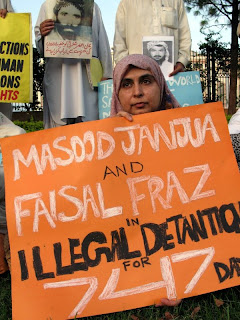

Amnesty International is concerned about reports of human rights violations in Baluchistan province which have escalated in the last two months. Recent violations have occurred in the context of a security operation in the province triggered by an attempt on President Pervez Musharraf's life in December 2005. However the current intensification of tensions also flows from long-standing grievances felt by the local population in relation to severe economic underdevelopment and failures to receive the benefits of large-scale exploitation of the province's natural resources.
A non-governmental Human Rights Commission of Pakistan (HRCP) report found scores of cases of arbitrary arrests and detention, torture, extrajudicial executions, “disappearances” and use of excessive force by security and intelligence forces committed since early 2005. Amongst the victims are women, children and many political activists. In addition, the Commission noted with concern that armed Baloch fighters opposing the army's presence in the province have laid landmines as a result of which civilians have been indiscriminately killed and maimed.
Though Amnesty International has not been in a position to visit Balochistan to investigate these allegations of human rights violations, the organisation considers the findings of the HRCP's report to be credible, and strongly supports the Commission's demand that human rights abuses be stopped forthwith and that all allegations of violations of human rights, including civil, political and economic rights, be independently and impartially investigated with a view to bringing the perpetrators to justice.
Amnesty International also appeals to all armed fighters and armed groups to abide by international humanitarian law, in particular the rules that are binding on all parties to a non-international armed conflict. These rules prohibit, inter alia, torture, hostage-taking, deliberate killing of civilians and other non-combatants and indiscriminate attacks.
The findings of the HRCP fact-finding mission corroborate a large number of reports received by Amnesty International from Baloch activists and civil society organisations since early 2005. According to a January 2006 statement by Senator Sanaullah Baloch, at least 180 people have died in bombings, 122 children have been killed by paramilitary troops and hundreds of people have been arrested since the beginning of the campaign in early 2005. On 8 December 2005, the federal Interior Minister stated that some 4,000 people had been arrested in Balochistan since the beginning of 2005. The identities, whereabouts of and charges against many of these detainees remain unknown. Having monitored some of these cases of detention and "disappearance", Amnesty International fears that some of the detainees may have been arbitrarily detained, or held under preventive detention legislation or on politically motivated criminal charges, in violation of Pakistan statutory law and international human rights standards.
Since the HRCP concluded its fact-finding visit, further reports of human rights violations have been received. Twelve men, arrested after an attack on a Frontier Corps unit on 11 January 2006, were reportedly extrajudicially executed killed in the Dera Bugti camp of the Frontier Corps when news arrived that three of the injured soldiers had died. Two elderly villagers sent to collect the bodies were also killed. On 16 January 2006, three children were reportedly killed in Kahan by aerial bombardment. On 7 February, a bomb, possibly planted by armed fighters, blew up a bus killing 13 people travelling in it.
Amnesty International is also concerned that the fact-finding team of the HRCP and journalists accompanying them were attacked on 8 January 2006 when their cars were fired at for several minutes near Kashmore. Although the HRCP team submitted an application to police in Rojhan to file a complaint, police did not comply nor investigate the alleged attempted murder.
Journalists have also been arbitrarily detained, harassed and threatened by intelligence agencies if they continued to investigate incidents in Balochistan. Amnesty International believes that it is important that journalists and human rights defenders can pursue their legitimate roles unimpeded and without fear, so that human rights violations can be monitored and brought to public attention, Remedies may then be found to ensure the protection and promotion of human rights in the province.

No comments:
Post a Comment